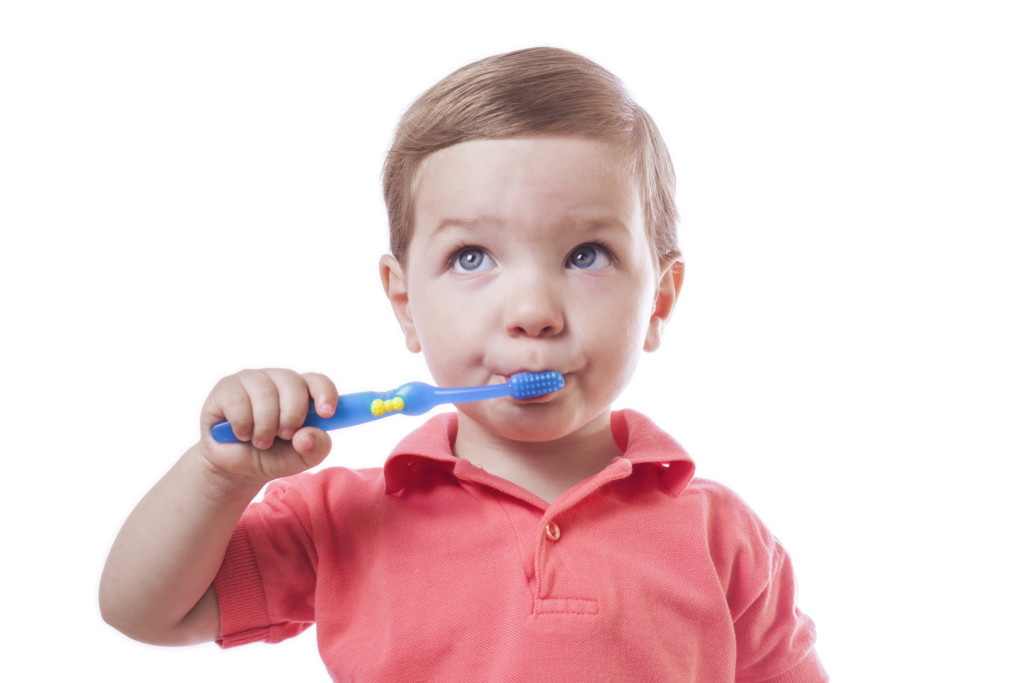
Amidst the baby announcements, nursery plans, car seat research, preschool registration, and college savings accounts, you may be unable to imagine adding yet another “to do” to your list. This “to do,” however, supports more than the old adage that “an ounce of prevention is worth a pound of cure.”
According to the American Academy of Pediatric Dentistry (AAPD), each child should have an initial dental examination by the age of one or within six months of the eruption of the first tooth. By establishing a dental home at an early age and before dental problems arise, children benefit from early exposure and desensitization to the dental office, a benign environment that a child’s imagination may deem to be an intimidating frontier.
While dental caries is the most common chronic disease of childhood, it is also preventable. During your child’s first visit, your pediatric dentist will complete an examination to screen for cavities, disturbances in tooth eruption, and developmental concerns, including tongue and lip ties.
Often, parents may be hesitant to bring their children in at an early age due to concerns that their child may cry or be upset in a new environment. While your pediatric dentist will work to minimize those fears and make your child’s visit a positive experience, it is not uncommon for infants to cry during a cleaning and fluoride application or even during a simple examination sitting in a parent’s lap. With each subsequent visit, children become more familiar with the visit and less hesitant. Trust is established, and new parts of the dental visit, including dental radiographs, may be introduced over several appointments — when patients are introduced to the dentist at an early stage in life.
If you wait until you feel your child is “old enough for the dentist,” many problems may have already started to develop. As you know, the first baby teeth start to erupt as early as six months! Baby teeth are different than adult teeth, and cavities affecting baby teeth progress more quickly and may go unnoticed until a child complains of discomfort from a cavity. Just as it is important to establish routine care with the pediatrician, it is equally important to see a pediatric dentist by your child’s first birthday and every six months thereafter— even if your child has only a few teeth!
Wondering how you can create an “ounce of prevention” for your child’s oral health? Here are our top five tooth tips:
- Establish a dental home by your child’s first birthday or within six months of the eruption of your child’s first tooth. Pediatric dentists have completed additional residency training and are the “pediatricians of the oral cavity.” We know how to have fun! Most importantly, however, we are specialty trained in working with children and patients with special health care needs. We focus on prevention, but we are prepared to treat your children and meet them where they are with our multiple tools and “tricks” for indicated treatment.
- Use an appropriate amount of fluoridated toothpaste and complete brushing and flossing for your children. If you control the amount of fluoridated toothpaste on your child’s toothbrush, you may confidently support strong teeth and safe oral hygiene practices. The AAPD recommends the following amounts of fluoridated toothpaste for healthy teeth:
 While a “smear” of toothpaste is recommended for children 0-3 years of age, a “pea-sized” amount of toothpaste is recommended for children 3 years and older.
While a “smear” of toothpaste is recommended for children 0-3 years of age, a “pea-sized” amount of toothpaste is recommended for children 3 years and older. - Praise your children for their help with a job well done, but you should always assist and complete brushing to ensure all teeth are cleaned effectively. It is recommended that parents assist until children are at least 8 years of age or until they can tie their own shoelaces.
- Never place your child to sleep with a bottle of milk or juice. While these delicious beverages may appease the palate, they have high concentrations of sugar and feed dreaded “sugar bugs” while your child sleeps.
- After nursing, use a clean wet washcloth to wipe gums and teeth. Although it is nutritious, breast milk contains sugars that can lead to dental decay.
*Click HERE for more recommendations from the American Academy of Pediatric Dentistry.
As parents, you wear a multitude of hats and place an incredible amount of pressure on yourselves to provide and deliver the absolute best for your children. Life happens, and children do get cavities and experience unexpected dental injuries from falls and sports injuries. When looking for a dental home for routine cleanings, restorations, and the unexpected dental emergencies, know you can trust the team at Camp Smile Pediatric Dentistry to compassionately deliver care for your child. Meet the team, tour our three offices, and find more tips and tricks by checking out our website HERE.
With convenient locations in Plymouth, Excelsior, and Chaska, Camp Smile Pediatric Dentistry is a well-established specialty dental practice and welcomes new patients and families. For infants under 18 months of age, the first visit is complimentary.

 While a “smear” of toothpaste is recommended for children 0-3 years of age, a “pea-sized” amount of toothpaste is recommended for children 3 years and older.
While a “smear” of toothpaste is recommended for children 0-3 years of age, a “pea-sized” amount of toothpaste is recommended for children 3 years and older.